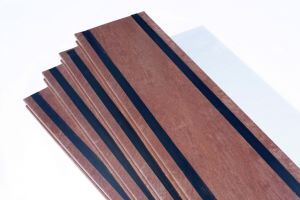In "All-Polymer", fibre-reinforced composites (KFVW) are used to upgrade recycled plastics. The cooperation of sustainability researchers, polymers, recycling and fibre composite experts from different industries, aims to establish closed loop recycling management systems that lead to a considerable reduction in CO2 emissions and plastic waste.
New potential for fibers
The project aims at increasing the performance of recycled plastics in lightweight construction. As a result, the proportion of recycled material in existing products can be increased and new product segments for recycled plastics can be opened up. As the KFVWs are single-sort and are therefore 100 percent recyclable, a complete recycling cycle is established. The higher performance also ensures energy savings during the product life cycle.
To maintain the mechanical properties defined in advance, the components are fibre-reinforced. For this purpose, existing as well as new processes such as additive tape laying - the automated laying of polyethylene-fibre-reinforced tapes on flat structures - are used. The fibre-reinforced components made of recycled plastic are analysed for their mechanical properties and fed into the process at the respective recycling companies. In addition, the influence of the fibres on the properties of the recycled material is being investigated.
The recycled fibre-reinforced components are to be used again as starting material to create a cycle. Even the use of a small proportion of fibre-reinforced material leads to a considerable improvement in the mechanical properties of the component, so that this approach is already worthwhile for products in the low-price segment due to process simplifications, material savings and increased use of secondary plastics.

Results (Status June 2022)
By investigating the adhesion of tapes to different components as well as by characterizing the mechanical properties of the UD tapes the specific requirements could be met and the component properties could be adapted accordingly. The tapes were applied to the components either by welding or pressing. Both processes led to significant improvements by realizing the specific requirements of the different components. Stable processes leading to well adhering tapes were realized. The technical development was accompanied by a study of ecological and economic conditions. A circularity assessment was carried out to determine the status quo of the participating companies with regard to the circular economy. This revealed the vast potential on which the project participants could further build to reach higher sustainability. A life cycle analysis, including the carbon footprint, was also carried out for one of the use cases.
The technical, ecological and economic results show that several kinds of product upgrades can be realized. The use of fiber-reinforced tapes can increase the recyclate content. It also can compensate the loss of performance common in recycled materials. Thus new areas of high-grade applications can be opened up for components that are already 100% recyclable. Another possibility is to reinforce components, which can then be made lighter in design. This not only saves plastic, but also saves energy during the life cycle of the product at every transport stage.

Project team from industry and science
In All-Polymer, the project participants from industry and science are working in a division of labour in order to achieve their recycling goals. The companies HAHN Kunststoffe, BSB Recycling and TOMRA deal with the investigation of existing recycling materials from various sources as well as the recycling of the fibre-reinforced components. Infinex Kunststofftechnik, HAHN Kunststoffe, Schütz und Röchling define the prototypes and, if necessary, develop new processes for the use of the polyethylene-fibre-reinforced tapes. A+ Composites and DSM investigate the production of the fibre-reinforced tapes and their modification for use with secondary plastics. The process integration and process development of the other partners is accompanied by A+ Composites.
The tasks of the materials physics group at the University of Koblenz Landau are the improvement of the fibre adhesion with the matrix as well as the characterisation of the components, materials and tapes and the development of the recycling process. The Chair of Sustainability Management at the TU Kaiserslautern will deal with government incentive systems, the development of business models and the investigation of ecological implications.
Publications
Rathgeber,S., Brzeski, M.: Stark mit mehr Rezyklat, UmweltMagazin (2023), S. 16-18: https://www.ingenieur.de/wp-content/uploads/2023/09/UmweltMagazin_9-10_2023_UMW-9-10-2023.pdf
Goerzen, J.: Fully recyclable fiber composite plastics for the circular economy, Waste Management World (2023): https://waste-management-world.com/resource-use/fully-recyclable-fiber-composite-plastics-for-the-circular-economy
Spraul, K. & Stumpf, S. (2022). Circular Business Models: A Network Approach to Promote Circularity and Value Co-Creation from the Producer’s Perspective. In Bals, L., Tate, W.L., & Ellram, L.M. (Eds.), Circular Economy Supply Chains: From Chains to Systems (pp. 89-107). Emerald Publishing Limited, Bingley. https://doi.org/10.1108/978-1-83982-544-620221005
Project flyer of the funding measure (German / English) (March 2021)
The project flyers offer an insight into the contents and goals of the ReziProK projects and present first results in each case.
Project sheets of the funding measure (German) (August 2019)
The project sheets provide a brief overview of the individual projects and their goals.
Contributions to the ReziProK Transfer Conference in June 2022
Poster (German) (June 2022)
Presentation (German) (June 2022)
Picture credits: All-Polymer project partners
